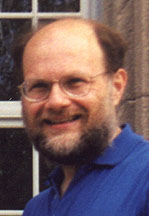
Sienkewicz to appear on WGN's Extension 720
 |
|
| Tom Sienkewicz, editor of the recently- published "World Dictionary of Foreign Expressions," will discuss the origins of words on Thursday night's Extension 720 program. | |
Hosted by Milton Rosenberg, the live program will air from 9 until 11 p.m. on AM 720. It will also be accessible over the Internet using RealAudio by logging on to the wgnradio.com website.
Sienkewicz, the Minnie Billings Capron Professor of Classics of Monmouth College, has drawn national attention for editing the book "World Dictionary of Foreign Expressions: A Resource for Readers and Writers," a project he completed for his late colleague, Gabriel Adeleye.
Earning a guest spot on "Extension 720" has been called "the single best booking in Chicago (after Oprah)," and is nationally known as one of the best programs for authors. Rosenberg, a professor at the University of Chicago, tackles a different subject five nights per week, usually inviting a total of two or three guests for a roundtable discussion.
Joining Sienkewicz on the show will be Mike Agnes, an editor from "Webster’s Dictionary," and Alan Metcalf of MacMurray College, the author of "The World in So Many Words." The trio will debate what’s in the Englsh language, how it got there, and if it should even be there at all.
Adeleye had worked for 20 years to put together a reference tool that would help professionals and scholars in Africa understand the steady presence of foreign-based words in their readings – specifically words influenced by the Latin, Greek, French and German languages. He passed away unexpectedly in 1994, however.
"When he died, his widow (Ruth) asked me to get the work in publishable form," said Sienkewicz, who brought uniformity to the dictionary and "enhanced its international flavor" by adding a number Hebrew, Hindi, Japanese and Yiddish citations.
"I had to work on the format and I had some influence on the content," said Sienkewicz. "We felt it should be a world dictionary. We also wanted to make it more appealing to an American audience."
The result is a book which features many words and phrases that we use commonly without really knowing why.
"I think people are unfamiliar with how often they are speaking in a foreign language when they speak English," Sienkewicz said. "My son Richard used to like to call someone a ‘putz.’ I told him to look it up. Once he did, he never used it again."
The dictionary costs $29.95 in paperback, and the good reviews have already started coming in.
"There is more scholarship and just plain useful information in ‘The World Dictionary of
Foreign Expressions’ than in any comparable publication I know of," said William Murchison, a nationally syndicated columnist. "My copy is fated to become dog-eared in no time at all."
"A quick scan provides intriguing expressions in languages from Sanskrit to Yiddish. Not too quick, though, since almost every entry invites contemplation," wrote Neil Steinberg of the Chicago Sun-Times.
| Back to the top
© 1999 The Monmouth College. All Rights Reserved. |